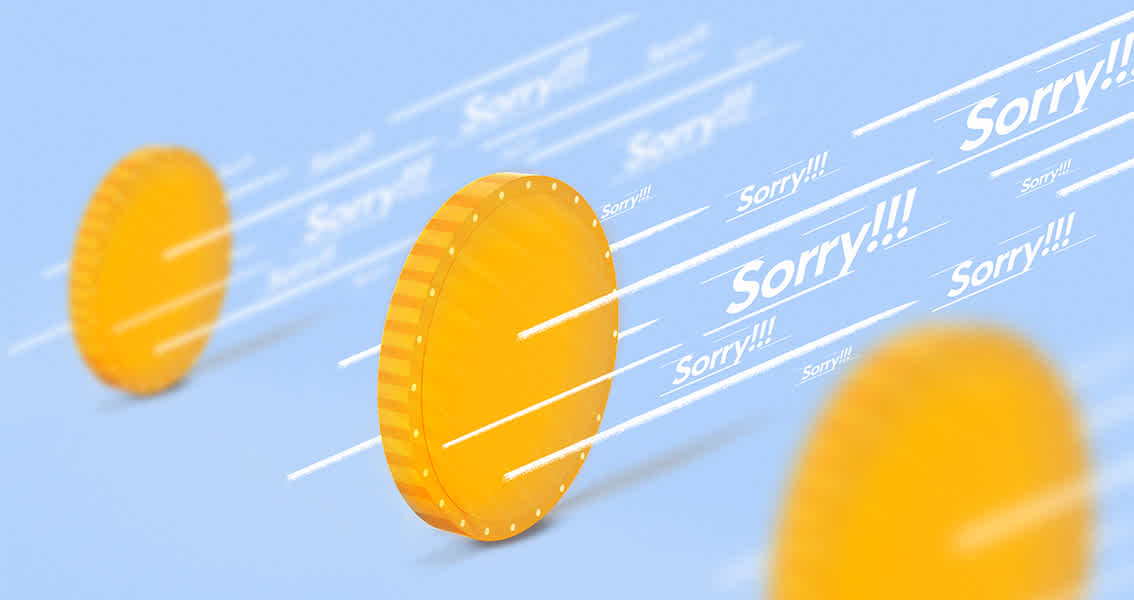5 common excuses for late payments (and how to respond to them)

Last editedMay 20203 min read
If you’re delivering services on time to your clients, it can be frustrating to be met with excuses for late payment, which typically fall into one of four categories: systems error, supply chain, company crisis or dispute.
Here’s five of the most commonly-used excuses for not paying invoices on time, along with our tips on how to respond, so that you get the money in your bank ASAP.
Systems error
“We haven’t received your invoice”
Often, a client who is trying to delay payment will wait until payment is due before advising you that they didn’t receive your invoice.
Response: Send your client an email asking for confirmation of receipt of your invoice – for example, seven days after dispatch. Or you can ask your client to send you an email acknowledgement upon receipt of your invoice. Either way, you’ll have time to re-send your invoice, if necessary.
You can also send a reminder email to your client one week before your invoice is due for payment. This will give you an electronic paper trail, which will prove useful if you later have to take formal steps to recover payment.
If your invoices are regularly going astray, you may want to switch to Direct Debit, which prevents late payments by automating your firm’s payment process – removing the hassle of your clients having to manually pay your invoices.
“Your cheque is in the post”
Nowadays, it’s unlikely that your firm is paid by cheque, but the general principle is that “payment is on the way.”
Response: Ask your client for proof of postage or ‘remittance advice’ (a letter from their finance department proving that payment has been made).
Alternatively, you can request that your client cancels the first cheque and sends another one by first class recorded delivery.
On the other hand, why not offer your client an online, automated payment option like Direct Debit? Funds will be instantly debited from your client’s account, leaving your team to focus on your work (rather than invoice-chasing).
Supply chain
“We haven’t been paid by our clients yet”
A client may claim that they can’t pay your invoice on time because they haven’t yet received payment from one of their clients.
If you're an accountancy firm, the cash flow argument is one of the more difficult excuses for your client to make. As your client’s accountant, you will already be aware of your client's financial position – including their cash flow situation.
Response: Assuming that your client has genuine cash flow issues, you may want to ask them to consider making: * Stage payments; * Part-payment now with the balance to be settled upon payment by the client’s debtor; or * Full payment in advance (where your firm uses a Direct Debit solution, such as GoCardless).
Company crisis
“The person who authorises your payment is not in the office today”
This excuse can be made year-round, but is usually made during holidays.
Response: Confirm when the authorised person will return to the office and chase payment of your unpaid invoice on that date.
Another option is to ask your client for the contact details of a substitute staff member authorised to make a one-off electronic payment and request that one is actioned.
Dispute
“There’s a problem with your work”
It’s par for the course for a client to withhold payment for services on the grounds that they’re dissatisfied with them. Occasionally, they will lodge a complaint with a view to seeking a reduction of your invoice (or to avoid paying it altogether).
Response: If your client mentions their dissatisfaction with your firm’s work well before the invoice payment deadline, their complaint is more likely to be genuine. In this instance, detail your client’s concerns and agree a remedial course of action in writing. This will enable your firm to resolve the dispute and still be paid within your credit terms.
To prevent the dispute being used as a stalling tactic, consider inserting the following clause in your terms and conditions (T&Cs): “Our T&Cs state that complaints about the quality of our work must be made within seven days of our invoice being issued, after which any complaints will be time-barred.”
Put down your client’s accounts (until they pay)
Continuing work for a persistent late-paying client in the hope that they will eventually pay up is not a wise approach. So, collect the money you’re owed before doing further work for them.
It’s worth bearing in mind that, when considering working with larger companies (as opposed to SMEs), your firm can now research how long it usually takes them to pay their invoices. By doing your due diligence, hopefully you won’t get any unpleasant surprises!

